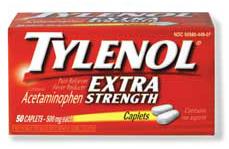Lawsuits
Tylenol faces lawsuits, federal probes over recalls
 When a saboteur laced Tylenol capsules with cyanide in 1982, killing seven people in the Chicago area, Johnson & Johnson's quick recall of millions of capsules, free replacement medicines and frequent updates set the standard for public relations in a crisis.
When a saboteur laced Tylenol capsules with cyanide in 1982, killing seven people in the Chicago area, Johnson & Johnson's quick recall of millions of capsules, free replacement medicines and frequent updates set the standard for public relations in a crisis.
But on April 30, the company again faced a recall, this time of more than 136 million bottles of pediatric Tylenol, Motrin, Benadryl and Zyrtec due to manufacturing problems. Suddenly, the company's halo is showing some tarnish. Investigators haven't linked the defects in the medication to any health problems, but the U.S. Food and Drug Administration said the division of the company responsible for quality control at the Pennsylvania-based plant, McNeil Consumer Healthcare, had a pattern of violations and delayed reporting problems to the agency.
While Johnson & Johnson's troubles have drawn less attention than BP PLC and Toyota Motor Corp., the company is facing legal problems on several fronts. Two class actions have been filed against the McNeil division -- one in the Northern District of Illinois and the other in the Eastern District of Pennsylvania -- trying to force it to broaden the recall and offer cash refunds instead of coupons for new products. Shareholders filed suit against the New Brunswick, N.J.-based Johnson & Johnson in New Jersey, alleging the board breached its good-faith duty for failing to act after the FDA had expressed earlier concerns about quality control and manufacturing practices at the plant.
"It markets itself as a company that takes children's safety very seriously and that's why they can charge a premium price for the Tylenol," said Donald Haviland Jr. of Philadelphia's Haviland Hughes who represents plaintiffs in the Pennsylvania suit. "People [are] willing to pay the premium price because of that reputation for safety. Now they're being deceived. We want to make sure that value is offered." Haviland said he expects the class actions to be combined.
The FDA, meanwhile, is considering criminal penalties against McNeil. And the House Committee on Oversight and Government Reform, which held a hearing on the recalls on May 27, is still sniffing around the issue. Committee Chair Edolphus Towns, D-N.Y., said he plans to introduce legislation giving the FDA mandatory recall authority.
Jeffrey Leebaw, a spokesman for Johnson & Johnson, said the company won't comment on pending litigation. But he confirmed that Sidley Austin has been hired to represent the company in the shareholder case, and said Johnson & Johnson has not yet retained outside counsel to defend the class actions. In Washington, Covington & Burling is working for the company on issues related to the recall, including the FDA and congressional investigations, Leebaw said. Leebaw wouldn't name specific lawyers working on the matters. Both firms have worked with Johnson & Johnson in the past.
Johnson & Johnson also has a steady roster of Washington lobbyists. The company's lobbying expenses were $2.1 million in the first quarter of 2010, before the recall, and nearly $6.4 million in 2009. Its Washington office includes 14 in-house registered lobbyists. Eleven outside lobbying firms have registered the company as a client, including Akin Gump Strauss Hauer & Feld ($50,000 in the first quarter of 2010), Brownstein Hyatt Farber Schreck ($90,000) and Cornerstone Government Relations ($40,000). Foley Hoag lobbies for McNeil.
Leebaw said the company has been in contact with members of the oversight committee, as well as members of the New Jersey and Pennsylvania delegations, where the company has a significant presence. Barney Skladany Jr., a partner at Akin Gump registered to lobby for Johnson & Johnson, said that, before last month's hearing on the recalls, he contacted the offices of some members of Congress to find out if members were planning to attend the hearing and "any particular points of interest that they might have had."
Wiley Rein's Bert Rein, a food and drug lawyer who does not represent Johnson & Johnson, said the company should cooperate with the FDA. Satisfying the agency's concerns "is of great value to the company because it says we've opened ourselves up, we've satisfied them," he said. "The value of the brand is such that that's got to be the first thought."
(Published by Law.com – June 7, 2010)